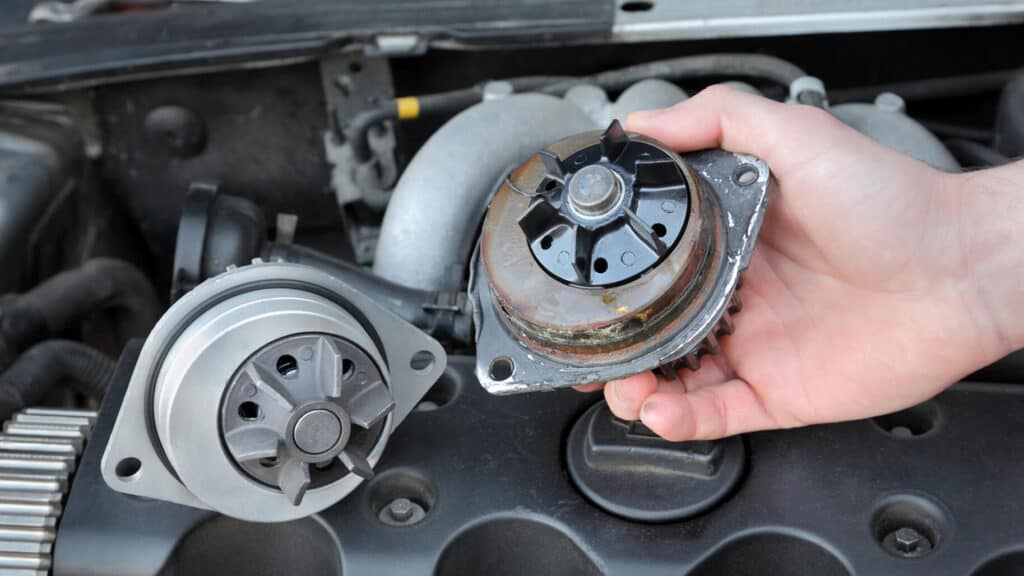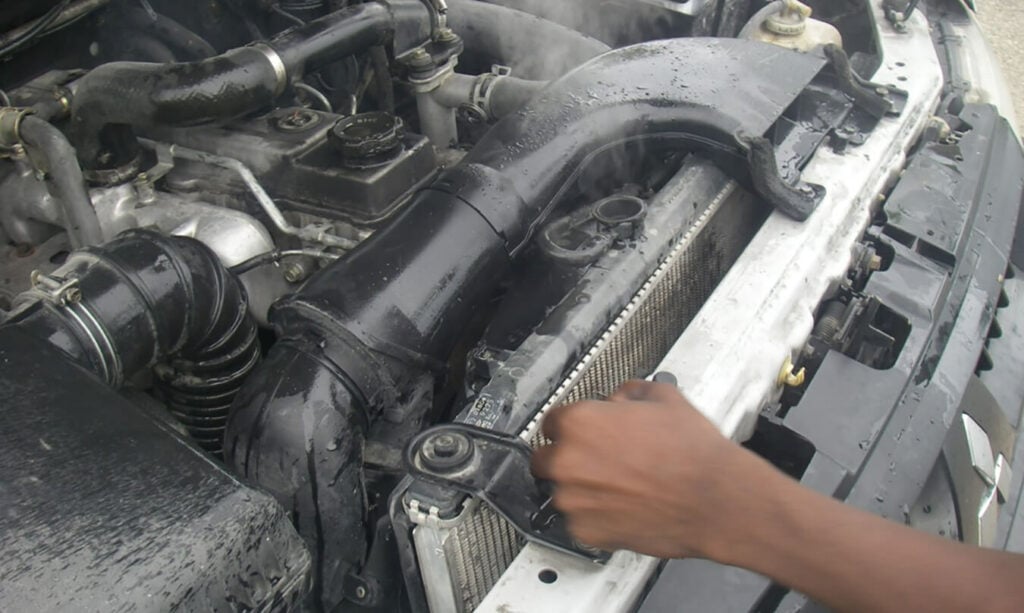Navigating the Waters of Water Pump Health
The water pump is an unsung hero in your vehicle’s cooling system, playing a pivotal role in engine health. It’s the heart of the cooling system, circulating coolant to regulate temperature and prevent overheating. Understanding how and why these pumps fail is crucial to maintaining your vehicle’s longevity.
Unveiling the Culprits: Key Causes of Water Pump Failure
Understanding these key causes can help in early detection and prevention of water pump failures, ensuring the longevity of your vehicle’s cooling system.
Wear and Tear Over Time: Like any mechanical component, water pumps are subject to natural wear and tear. The degradation of the pump’s seals and bearings over time can lead to reduced efficiency and eventual failure. Regular wear can be exacerbated by harsh driving conditions or high mileage.
Poor Maintenance Practices: Neglecting routine maintenance can accelerate water pump failure. This includes failing to replace the coolant at recommended intervals, which can lead to the buildup of contaminants that corrode the pump and its components.
Incorrect Coolant Types: Using the wrong type of coolant can be detrimental to your water pump. Different engines require specific types of coolant, and using an incompatible type can lead to chemical reactions that cause corrosion and damage to the pump.
Inconsistent Coolant Levels: Low coolant levels increase the risk of overheating and put extra strain on the water pump. Conversely, overfilling the coolant can cause excessive pressure in the system, leading to leaks and pump damage.
Leakage and Seal Failure: The seals and gaskets in a water pump can fail due to age or contamination, leading to coolant leaks. These leaks not only reduce the efficiency of the cooling system but can also cause the pump to run dry and overheat.
Impeller Issues: The impeller inside the water pump can become damaged or loose, affecting its ability to circulate coolant effectively. In some cases, impellers made from substandard materials can degrade, leading to pump failure.
Belt and Pulley Problems: For water pumps driven by a belt, issues with the belt or pulley system, such as misalignment or tension problems, can lead to pump failure. A snapped belt can immediately halt the pump’s operation, causing the engine to overheat rapidly.
Electrical Failures in Electric Pumps: In vehicles with electric water pumps, electrical faults can lead to pump failure. This includes issues with the wiring, fuses, or control modules that manage the pump’s operation.

Silent Symptoms: Recognizing the Signs of a Failing Water Pump
Recognizing early signs of water pump failure can save you from a roadside breakdown. Ignoring these signs could lead to more severe engine damage:
• Unusual Noises: Keep an ear out for any strange noises emanating from the front of your vehicle. A whining, grinding, or groaning sound near the water pump area often indicates a failing bearing within the pump. These sounds may become more pronounced as the engine revs up.
• Overheating Engine: One of the water pump’s primary roles is to help regulate the engine’s temperature. If your vehicle’s temperature gauge is consistently reading higher than normal, or if you notice steam coming from under the hood, it could be a symptom of a failing water pump unable to circulate coolant effectively.
• Visible Coolant Leaks: Inspect the area around the water pump for signs of coolant leakage. Puddles of coolant under the car or a coolant residue around the pump housing are warning signs. A leaking water pump can rapidly lead to an underperforming cooling system and engine overheating.
• Rust and Corrosion: Look out for rust or corrosion on the water pump itself. These can compromise the integrity of the pump, leading to leaks or internal damage. Rust often indicates a long-standing issue that has been neglected.
• Low Coolant Levels: Consistently low coolant levels without any obvious leaks elsewhere could point to a problem with the water pump. A malfunctioning pump may not circulate coolant properly, leading to reduced levels in the reservoir.
• Erratic Temperature Fluctuations: If the engine temperature gauge fluctuates unpredictably – especially during long drives or in heavy traffic – it could indicate a water pump struggling to maintain consistent coolant circulation.
• Reduced Heater Efficiency: A failing water pump can also affect your vehicle’s heating system. If you notice that your car heater isn’t working as effectively as usual, it could be due to poor coolant circulation caused by a failing pump.
The Lifespan Journey of a Water Pump
• Durability and Dependence: The water pump, an essential part of your vehicle’s cooling system, typically boasts a robust lifespan. Generally, a water pump is designed to last between 96,000 to 144,000 kilometers. However, this range can vary based on factors such as the vehicle type, the quality of the pump, and the environmental conditions in which the vehicle is operated.
• Maintenance Matters: The longevity of the water pump is greatly influenced by maintenance practices. Regular servicing, which includes timely coolant changes and ensuring that the cooling system is devoid of contaminants, can significantly prolong the life of a water pump. Conversely, neglecting maintenance can lead to premature failure of the pump.
• Driving Habits and Conditions: The durability of the water pump is also affected by your driving habits and the conditions in which you drive. Regularly driving in demanding conditions, like stop-and-go traffic or in extreme weather, can impose additional strain on the water pump. Driving frequently under such conditions may require more regular inspections and potentially earlier replacements.
Three Modes of Water Pump Failure: What Every Driver Should Know
Leakage Concerns: One of the most common failure modes of a water pump is leakage. This can occur around the pump’s gasket or through the weep hole, a small opening designed to alert you to bearing failure or seal deterioration. These leaks can be slow and difficult to detect, often requiring close inspection.
Bearing Failures – The Noisy Indicator: The water pump’s bearings can wear out over time, leading to failure. This is often preempted by a noticeable noise from the pump area – a whining, grinding, or groaning sound. Ignoring these sounds can lead to complete pump failure, potentially causing overheating and significant engine damage.
Impeller Wear and Tear: The impeller, the part of the pump that moves the coolant, can degrade or become less effective over time. This is particularly true in pumps where the impeller is made of plastic. Wear or damage to the impeller can result in inadequate coolant circulation, leading to engine overheating. In some cases, the impeller may even break apart, causing immediate and severe cooling system failure.
Understanding these failure modes can help drivers remain vigilant and proactive in maintaining their vehicle’s water pump. Regular check-ups and addressing any early signs of wear or damage can prevent more severe problems and costly repairs down the line.

When Water Pumps Deceive: Intermittent and Sudden Failures
Intermittent failures of the water pump can be particularly deceptive, as they often manifest in sporadic symptoms that can easily be overlooked or misdiagnosed. One day your vehicle might function perfectly, and the next, you notice overheating or strange noises coming from the engine bay. These intermittent issues can range from fluctuating temperature readings to irregular coolant circulation, often leaving drivers confused about the health of their water pump. Without regular checks and timely maintenance, these unpredictable symptoms can escalate, potentially leading to more serious mechanical failures.
Sudden water pump failures, in contrast, leave little room for doubt. They typically result in immediate and obvious problems, such as a significant rise in engine temperature, steam emanating from under the hood, or a complete breakdown of the cooling system. Such failures demand immediate attention and often occur at the most inopportune times, like during a long drive or in heavy traffic. The sudden nature of these failures underscores the importance of not only regular maintenance and inspection of the water pump and cooling system but also having a basic understanding of your vehicle’s warning signs to prevent being caught off guard.
Potential Repairs and Cost Breakdown: Addressing a Failed Water Pump
Initial Diagnosis: The first step in addressing a failed water pump is a thorough diagnosis to identify the extent of the damage. This could involve checking for leaks, examining the condition of the belt and pulleys, and assessing the overall health of the cooling system.
Replacement Costs: The cost of replacing a water pump typically ranges between $300 and $750. This price can fluctuate based on the make and model of the vehicle, as well as the complexity of the replacement process. Luxury or high-performance vehicles may incur higher costs due to more expensive parts and labor.
Additional Repairs: Often, a failed water pump may have caused or been caused by other issues in the cooling system. This could include damaged belts, faulty thermostats, or compromised radiator hoses. Addressing these additional issues will add to the overall cost of repair.
Labor Charges: Labor costs can vary significantly depending on the workshop and geographical location. The time required for replacement also impacts the cost – some vehicles may require more labor-intensive procedures to access and replace the water pump.
Coolant Replacement: After replacing the water pump, it’s usually necessary to replace the coolant as well. This is an additional cost that should be factored into the overall repair budget.
Warranty and Quality of Parts: The cost can also be influenced by the quality of the replacement pump and whether it comes with a warranty. Opting for a higher-quality pump with a warranty might be more expensive initially but can offer better value in the long run.
Cost-Effective Options: For those on a tight budget, there are cost-effective options like refurbished or aftermarket water pumps. However, it’s crucial to weigh the savings against the potential longevity and reliability of these parts.
Steering Clear of Troubled Waters
Regular maintenance and awareness of your vehicle’s water pump health are essential to avoid expensive repairs and ensure safe travels. Early detection of issues, understanding the signs of failure, and adhering to a regular maintenance schedule are vital. For those times when professional help is needed, Uchanics offers reliable mobile mechanic services in Canada, ensuring your vehicle remains in top condition, ready to face the road ahead.
